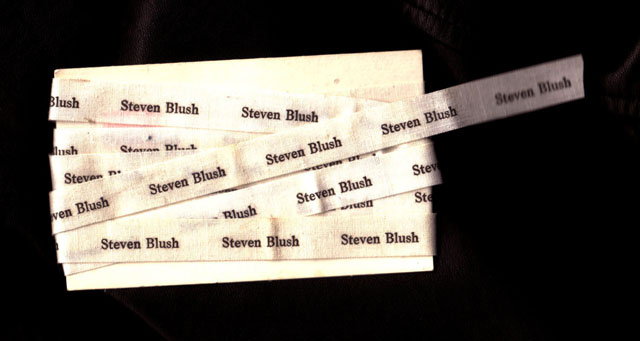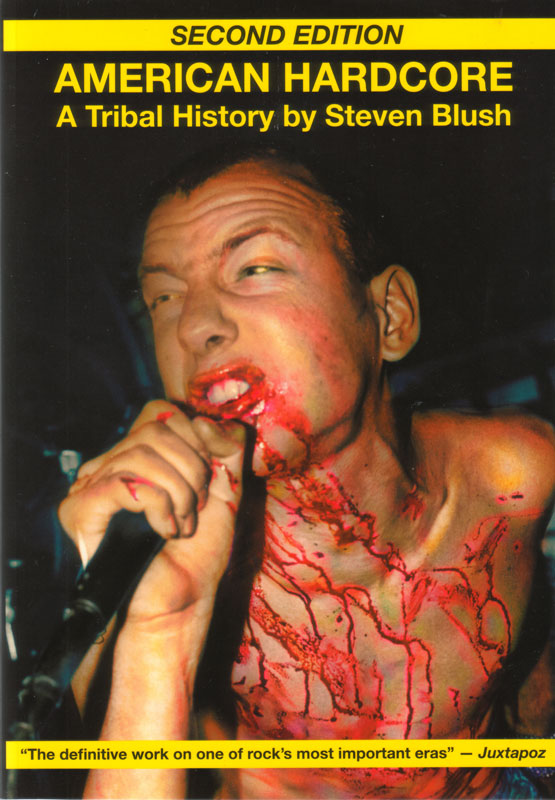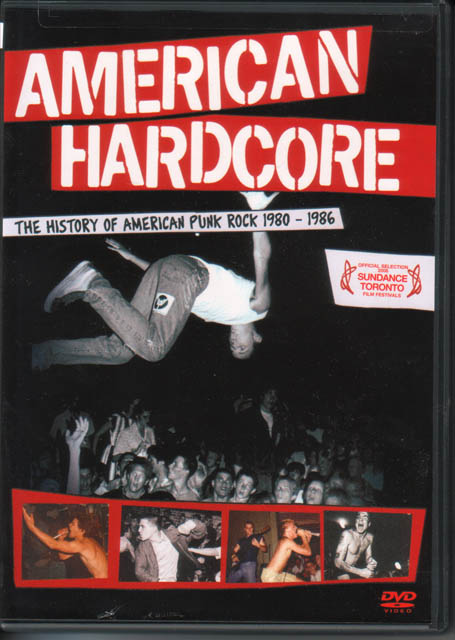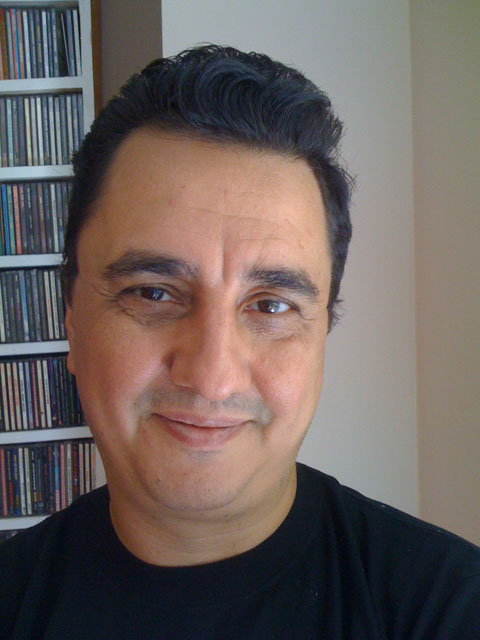TODD JOLICOEUR TALKS TO AUTHOR STEVEN BLUSH

Why would a rock guy who loves interviewing all the great musicians he listens to be interviewing an author? It's actually quite simple. This author has written probably the most authoritative book on the hardcore punk scene. But wait, there is more. This author has revisited that book and decided to reissue an updated version of that same book.
This author, Steven Blush, did more than write the stories of the hardcore punk bands, he lived those stories. He didn't just give the minimal effort and recite discography information. Blush went and dug up personal stories and anecdotes for the book, incorporating an insight to the lifestyle for those of us who missed out on the whole scene. His book, American Hardcore, set the standard for all things written about the hardcore punk scene.
I am waiting for that phone call trying to figure out how to alter my typical interview to encompass a novel when it occurs to me I am still talking to an artist about their creation and everything surrounding it. I start double checking my questions when my phone rings.
Todd: This is Todd.
Hello. It's Steven Blush. How are you?
Todd: I'm good, thanks. First, let me thank you for making time for the Rockpit. We are very honored you are allowing us this shot at a discussion.
Steven: Thanks, it's my pleasure.
Todd: Steven, let me start by letting you know I am used to interviewing musicians, so I will apologize now if the questions aren't what you are used to as an author.
Steven: Not at all. That's why we are working with the SKH Music for publicity on this. I wanted to use a very rock approach to the presentation of this book to the public. Steve (Karas) and his company are able to give me that.

The second edition of the Book
Todd: Great. On that note then, I will start with the obvious. Why now? Why drop an updated reissue now? Why not five years ago or three years from now?
Steven: I knew I always wanted to rework the book. After everything was said and done the first time around, I saw the things I would have done differently. Now I was able to rework what had been done and update it. When I first wrote this in 1995, it was pre-internet. There really was no information out there about the hardcore punk scene. The canvas was truly a blank slate. I watched a series on PBS, The History of Rock N Roll and for the punk scene it covered the bands and period from The Clash to Nirvana. It wasn't complete. There were no real Rolling Stone articles. There was almost no information at all to construct the history of the hardcore scene. The original book was like an archaeological dig. I tried to create a narrative of the scene, kinda like making a movie. As years passed, I thought about the ten years of new information available because of the internet and networking. There was more to say and more opinions to share. It seemed like it was time to put it all out there again. I had guys approaching me and asking "What about my band?" You know, they were probably right. I was and am man enough to own up to my mistakes and oversights.
Todd: With this reissue/revisit, can we expect the same for your other music project, American Hair Metal?
Steven: You know, that was a totally different project. Hardcore was real life. My world existed in that book. Hair Metal was written to strengthen my journalistic chops. I was literally very neutral with that project. I liked the music, but it wasn't part of me. I knew who the bands were, but was not familiar with the songs. I remember listening to the radio sometime in 1999 or 2000 and heard this great new song by AC/DC. Found out later it was Cinderella. I really discovered I had to rethink my shit. I started to rethink everything at that point, but the book was really not what I had in mind anyway. It was more or less written for my publisher. There was no substance to the book or the research that went into it. It just didn't hold up. It wound up converted to a very basic informational type coffee table book.
Todd: Based on all your knowledge and the friendships you collected over the years, I bet it is tough, but can you pick a favorite band from the genre?
Steven: Actually, this is quite easy. Hands down – Black Flag. I have such a great friendship, but also great admiration for Paul Rachtman. Another would have to be Bad Brains. These bands used everything in their power to tell their stories. They used the music and pictures as editorial on their views and thoughts on life.
Steven: They planted the seed. They were the musical Johnny Appleseed. You are from Detroit, right? I remember seeing these bands at small places all over, like the old Detroit Freezer Theater. It was all a new style and they took it to the masses and the street. It was perceived as negative instead of what it really was. It all started with a band – there were not many solo hardcore musicians back then. They all took everything beyond the musical form and it was a weird thing for the time. We were coming out of the disco era and what they called the New Wave of Metal from Britain. The music was different and had an odd style. Everything from the music to the look was misinterpreted. After those two bands, I dug the Dead Kennedy’s stuff from like ’80 to ‘86. This stuff really, at the heart of it, still influences and graces music to this day. Once heavy metal or glam mixed with hardcore in the late 80’s you had the birth of speed metal.

American Hardcore DVD
Todd: You did a documentary based on the book and the whole scene. With the updated book, any plans to update the film?
Steven: Right now, it is only the 5th anniversary of the film. This thing was a do it yourself project… totally a do it yourself thing. Some how it made its way to Sundance. When they approached me, Sony was very straight and honest about everything. They were great to work with. We are thinking we will definitely do something for the 10th anniversary of the project.
Steven: It will all need to be analyzed at that time. We will need to be cautious how we update or change parts, because hardcore is tactile and proud of it. Everything seems to be very tongue in cheek, but they mean what they mean and you do not want to think for a second that any of what happened in that scene was not the real thing. This was a whole subculture. These people all had ethics. Take Black Flag for instance. They did what they did because it felt right. They knew they had to go out and do it themselves and they were okay with that. They had a real entrepreneurial spirit, but for them, it was a way of life.
Steven: These bands and their following changed the face of not only music, but also society. Their music and attitude, their way of life was an extension of modern primitivism. You get someone like Henry Rollins. You know, David Lee Roth loved early Henry Rollins. He has a massive impact. These people did not see themselves as seers or visionaries. They were just happy being. There was such a bravery involved in being who they were and the attitude they had towards life. You know, society fucking hated you. If you had a shaved head, you were instantly assimilated to Charles Manson. Society did not understand, these people measured their success in non-financial terms. They understood what I like to call the Power of Art.
Todd: What is next on the horizon for you?
Steven: First off is a library tour I am doing [dates are in the news section here @ http://www.therockpit.net/news.php - TMJ]. I am doing a national tour to promote the book. I want to bring it to a new sector of music lovers who can maybe align themselves with something new and appreciate the roots of some of today’s music that is more aggressive.
Steven: I have a new film in production, Lost Rockers. If you go to www.lostrockers.com, you can check out a 1-minute trailer. This is about musicians who should have been famous and slipped through the cracks.
Steven: I am also starting to write a history of the New York music scene. I want to cover everything… the 40s and 50s, hardcore, heavy metal, soul. Even the early days.
Todd: Since you are as rock and roll as anyone I have interviewed, let me ask you a couple questions I like to ask of my musician subjects. If there was one song or album in the history of music that you could say you had a hand in, what would it be?
Steven: The first thing that came to mind was Madball’s new song, ‘Real American Hard Core.’ It just oozes hardcore… exactly the way I remember it.
If I had to think of an album, it would be Black Flag’s first album, Damage. It was so enlightening for me. It really spoke to me. Not to mention, if you listen to the second side, you can hear the start of grunge [yes folks, second side; flip the ALBUM over – TMJ].
Todd: Finally, to Steven Blush, what is the meaning of life?
Steven: Just to… hmm.
Steven: You know, the key is to not worry. None of it matters. If you live life how you wanted to, you won. It really is that simple. Do not worry about whether you did X, Y, and Z right. There is no right answer.
Steven: I raised hell and had to relearn who I was. At one point, I was a failure and now, because of this simple philosophy, I am more successful.
Todd: You know, I cannot think of a better way to end this interview. Thanks so much Steven. I really hope that tour winds up somehow in Detroit so I can thank you in person for your vision.
Steven: I will make sure that happens if I make it to Detroit. Thanks for your time.

Steven Blush
How do you follow that up? It is simple. You do not. You do not twist a classic. You do not taint simplicity and honesty. You do not try to change what was and what will be. Because of the scene we refer to as hardcore, we all have been influenced, for better or worse. Thanks for pointing that out to me Blush.
Thanks to Steve Karas at SKH Music for setting up this awesome time and to Jessica at Feral House for getting me an updated copy of this classic I read all those years ago.
To get your own copy of American Hardcore, visit your local bookstore (brick and mortar or internet based), catch the library tour, or go to www.feralhouse.com.
Todd Jolicoeur
October 2010